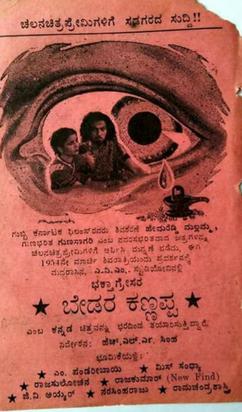
Bedara Kannappa is a 1954 Indian Kannada-language Hindu mythological film directed by H. L. N. Simha and written by G. V. Iyer. The film stars Rajkumar playing the title character along with Pandari Bai, Kushala Kumari, G. V. Iyer, Sandhya and Narasimharaju in other prominent roles. The film is an adaptation of a stage play by the Gubbi Veeranna Nataka Company, which was based on the folk tale of the hunter Kannappa who proves his extreme devotion to the Hindu God Shiva by gouging out both his eyes.

Gubbi Hampanna Veeranna was an Indian theatre director. He was one of the pioneers and most prolific contributors to Kannada theatre. He established the drama company, Gubbi Sree Channabasaveshwara Nataka Company, which played a crucial role in promoting the Kannada theatre field. He has been conferred the title Nataka Ratna meaning "A Precious Jewel" in the theatre world.

Budaguru Ramakrishnaiah Panthulu was an Indian film director, producer and actor. He is best known for directing films in Kannada, Tamil, Telugu and Hindi. His most popular films are Karnan, Veerapandiya Kattabomman, Sri Krishnadevaraya, School Master and Kittur Channamma, B. R. Panthulu, is a successful actor and converted Ma. Po. Si.'s biographic works Veerapandiya Kattabomman and Kappalottiya Thamizhan to celluloid.
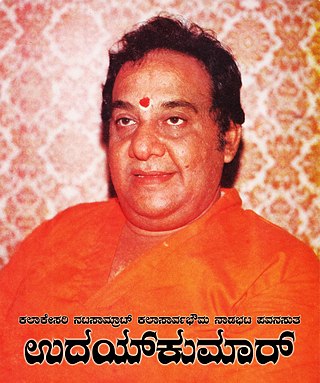
Bommasandra Srinivasaiah Suryanarayana Murthy, known by his screen name Udaykumar, was an Indian actor and producer in Kannada cinema. He, along with Kalyan Kumar and Rajkumar, were called the Kumarathrayaru of Kannada cinema He has authored many dramas and books. He has performed a broad range of roles and worked with all of the prominent actors of his day. He portrayed heroic characters early in his career later it became more nuanced villainous characters, often counterpointing Rajkumar's heroic persona in historicals and mythologicals.
Gunasagari is a 1953 Indian Kannada-language film directed by H. L. N. Simha and produced by AVM Productions. It stars Gubbi Veeranna, Honnappa Bhagavathar and Pandari Bai. The music was composed by R. Sudarshanam. The film was released in Tamil as Sathya Sodhanai. Malayalam actor Prem Nazir had a small role in this film which was his only Kannada film appearance. Rajasulochana made her debut with this film.

B. Jayashree is a veteran Indian theatre actress, director and singer, who has also acted in films and television and worked as dubbing artist in films. She is the creative director of Spandana Theatre, an amateur theatre company based in Bangalore, established in 1976.

Mysore Venkatappa Subbaiah Naidu was an Indian theatre and film actor. He was well known for his work in films like Sati Sulochana (1934)—the first Kannada talkie film, Bhookailas (1940) in Telugu, and Bhakta Prahlada (1958) in Kannada. He acted in the first Kannada talkie film and brought distinction to Kannada cinema. He was the father of Kannada actor Lokesh and the grandfather of Kannada TV personality Srujan Lokesh. Recognizing his work in theatre, he was awarded the Sangeet Natak Akademi Award in 1961.
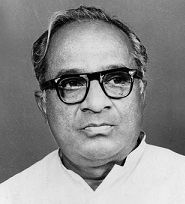
Hunsur Krishnamurthy was an Indian playwright, film director, producer, actor, screenwriter and lyricist in Kannada cinema.
Sadarame is a 1935 Indian Kannada language mythological drama film directed by Raja Chandrashekar and produced by Gubbi Veeranna, both making their film debuts. This film was the third sound film produced in Kannada cinema. The same film had a Tamil version released as Naveena Sadarame produced by K. Subramanyam and starred S. D. Subbulakshmi in the title role.

R. Nagarathnamma (1926–2012) was an Indian theatre personality and the founder of Stree Nataka Mandali, an all-women theatre group based in Bengaluru. A recipient of the Sangeet Natak Akademi Award, she was honored by the Government of India, in 2012, with the fourth highest Indian civilian award of Padma Shri.
Navajeevana is a 1964 Indian Kannada film, directed by P. S. Murthy and produced by Vadira and Jawahar. The film stars K. S. Ashwath, R. N. Sudarshan, Narasimharaju and Rathnakar in the lead roles. The film has musical score by Rajan–Nagendra.
Hemareddy Mallamma is a 1946 Indian Kannada-language film, directed by S. Soundarya Rajan and produced by Gubbi Veeranna. The film stars B. Jayamma, Honnappa Bhagavathar, Veeranna and C. B. Mallappa. The film has musical score by V. Nagayya.

Karkottai is a 1954 Indian Tamil-language film produced and directed by Kemparaj Urs. The film stars Kemparaj Urs and Krishna Kumari. It is based on the 1844 novel The Count of Monte Cristo by Alexandre Dumas.
Subhadra is a 1941 Indian Kannada film directed by P. Pullaiah based on a work of B. Puttaswamayya, who also wrote the film's screenplay. The film stars Gubbi Veeranna and Honnappa Bhagavathar in the lead roles. Musician B. Devendrappa, B. Raghavendra Rao, Vasudeva Girimaji, B. Jayamma, G. V. Malathamma and Gangubhai Gulegudda feature in supporting roles. Music for the film was composed by Padmanabha Shastry, Mallikarjun Mansur and Narahari Sastry.
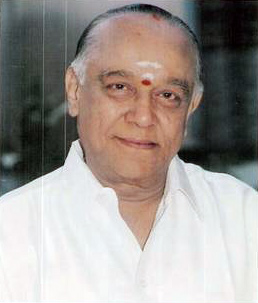
Hirannaiah or Hirannayya, known by his stage name Master Hirannaiah, was an Indian actor in the Kannada film industry and a theatre artist in Karnataka, India. His films include ...Re (2016), Care of Footpath 2 (2015), No. 73, Shanthi Nivasa (2007).
Dikki Madhava Rao was an Indian actor and singer known for his work as a character actor in Kannada-language films. He spent much of his early years as a stage actor in the 1920s and 1930s before appearing in Kannada films. He gained popularity with his role as the antagonist Kanyakumari Dikshit "Dikki" in the 1936 film Samsara Nauka. Subsequently, the name stuck to him as prefix.

Shanthamma was an Indian actress in the Kannada film industry, as well as in Hindi and Tamil, and a theatre artist in Karnataka, India. She was known for playing supporting and character roles.
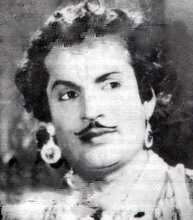
D. Kemaparaj Urs was an Indian freedom fighter, actor, director and producer who worked mainly in the Kannada film industry. His movies in 1940s and 1950s created an impact on the audience. Even before Dr. Rajkumar's arrival to the industry, Urs was already an established star. His elder brother D. Devaraj Urs, served as the Chief Minister of Karnataka.

Shanta Hublikar, was an actress and singer from early years of Indian cinema. Shanta worked in Marathi, Hindi and Kannada films from 1934 to 1963. Her songs Ab kis liye kalki baat from Aadmi and its Marathi version Kashala udyachi baat from Manoos became immensely popular and established her as a star actress of her time.
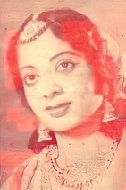
B. Jayamma was an Indian actress and singer. She began her career on stage as a 14-year-old when she joined a theatre group owned by Gubbi Veeranna, her future husband. She went on to perform for 45 years on stage while also appearing in 45 Kannada, Telugu and Tamil films.














